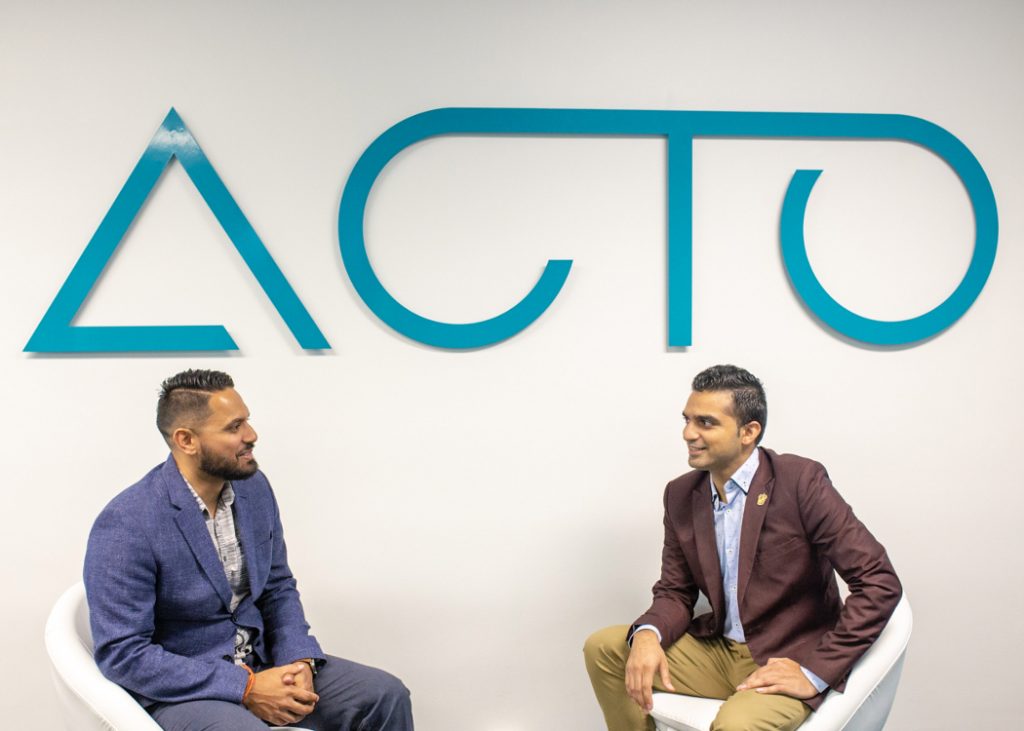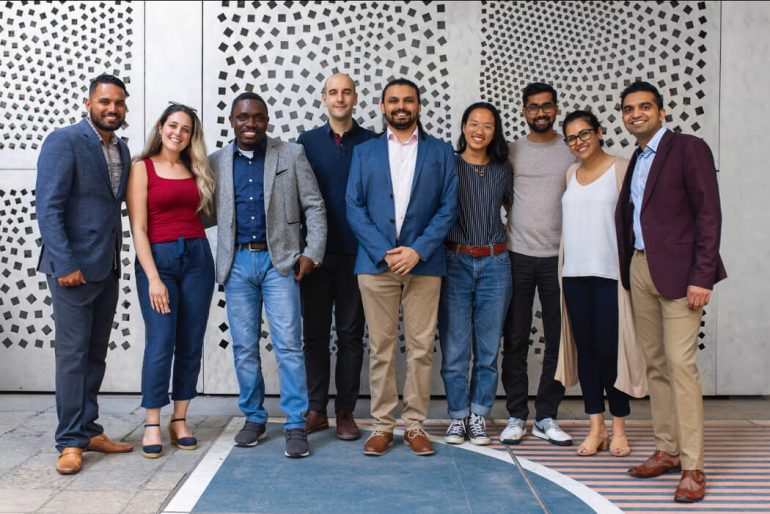The ‘Startup Growth Series’ showcases stories of entrepreneurs that have overcome obstacles in order to expand their businesses in Canada and abroad.
For many Canadian startups looking to grow, the United States seems like the perfect target: a large consumer market with cultural similarities. But there are costs to international expansion, and entering new markets with the wrong playbook can spell disaster.
For Toronto-based ACTO, expanding to the US led to a 30x increase in revenue growth. Here’s how the company made the call, and why it worked.
ACTO, getting its name from “Act-Today” started as a vertical-agnostic sales training and analytics platform. After realizing that life sciences companies were in dire need of good analytics for drug commercialization, ACTO pivoted to become a platform for life sciences sales professionals.
“On average it takes $2 billion dollars and 14 years to take a drug from the lab to bedside,” said Parth Khanna, founder and CEO of ACTO. “But when these products are entering the stream of commerce, senior leaders have no objective data coming back from the field to show if their [sales] strategies are working.”
ACTO’s platform now offers training, analytics, and data tracking for salespeople, something Khanna said life sciences companies clamor – and pay big money – for.
“We found really strong product-market fit, kept listening to customers, and built all the different nuances of this highly regulated world,” said Khanna. “And we saw the hockey stick curve. We saw 10x revenue growth in the first year. Then another 3x in the second year on top of that.”
Find your ‘supercluster’ for expansion
ACTO’s explosive revenue growth over that two year period came from its US-based clients. There are good reasons why most Canadian startups look to expand there: because it’s big and it’s close.
US expansion is also common practice with many other startups at the DMZ. Sampler, a DMZ alumni, started in Toronto but has expanded to include offices in Chicago and New York City. Fresh off of a $3 million Series A round, founder and CEO Marie Chevrier told BetaKit how important the US market can be for Canadian startups.
“We saw the hockey stick curve. We saw 10x revenue growth in the first year. Then another 3x in the second.”
– Parth Khanna
“I think every Canadian company should go to market in the US first,” Chevrier said. “There is 10-times more budget in the US than there is here. That’s the reality.”
ACTO did go to the US, but not for the reasons most startups do. Khanna said the company built its own set of criteria, looking for “superclusters” in its industry. He described a supercluster market as any small geographic region that has a high concentration of economic activity in a specific industry. It could be an entire country, specific cities or a smaller regional area.
“There are superclusters in every industry that give you immediate results with minimal effort,” said Khanna. “For us, it was Boston, Philadelphia, Raleigh [North Carolina], Princeton [New Jersey], and Minneapolis. But if I found in my analysis that Hanoi, Vietnam was a supercluster for the type of product that we’re selling, I’d be on the next flight there.”
Khanna explained that he’s turned down opportunities to seek clients in other wealthy markets around the world to focus on ACTO’s superclusters. For example, the company used to attend events in Europe before realizing they weren’t leading to the right kinds of buyers.
“We went to one of the biggest medical device conferences in the world, which happens in Dusseldorf, Germany,” Khanna said. “But when we came back, we realized a lot of the leads were European or Middle East-based companies, and those buyers didn’t have the [same] price point tolerance. They were more risk-averse than US buyers. So we have the discipline to say ‘no’ now.”
Geographic proximity to these US markets helped ACTO stay lean – bootstrapped at the time, the company only needed to take a Greyhound bus and could avoid multiple expensive flights, said Khanna – but ultimately the choice was not one of convenience but market opportunity. Focusing on impact is something he recommends as a key priority for any startup.
“As a startup you have limited resources to make an impact,” said Khanna. “You have to hone in on where you can get 80 percent of the results that you need.”

International expansion is won with boots on the ground
Once ACTO knew its supercluster markets, Khanna said the company’s priority was getting boots on the ground.
“There is no substitute to actually showing up and building relationships,” said Khanna. “If you think your technology delivers strategic value to a point where you can drive up your ACV [Average Contract Value], show up in person to talk to customers about their needs.”
Khanna illustrated the value of building relationships via ACTO’s sales process. The company originally used webinars to sell its technology when the average price hovered around $10,000 annually. Webinars helped the company acquire some initial customers, but the product was an “operational tool” at the time.
Today, the company sells contracts worth hundreds of thousands of dollars, a contract value Khanna said ACTO could not have closed without human relationships. Employees attend events in ACTO’s supercluster markets, build relationships with prospects in person, and offer a more consultative sales process than they did in the past.
“It does not matter how good I am, I can’t convince someone to cut me that cheque over a webinar – people want to meet you and talk to you,” said Khanna. “You have to show up, listen to them, and solve their problems to the end, including implementation, support, and everything that comes with it.”
Having boots on the ground is something Chevrier took seriously with Sampler, which samples products to consumers on behalf of consumer packaged goods (CPG) brands. Recognizing that a majority of those brands exist in key US markets, the startup set up sales offices in New York City and Chicago. Chevrier added, though, that opening offices is difficult in cities where you don’t have local connections and pre-existing customers.
“Talent is hard to attract in that market,” Chevrier said. “You have to have strong sales material and existing customers in order for you to attract that type of talent. I worked in New York [City], so I already had those friendships.”
Building from Canada
As ACTO continues to expand, the US remains a prime market, but Khanna isn’t rushing to open offices in the US or anywhere else in the world. While it’s on the company’s radar, Khanna doesn’t see an immediate need to relocate just because the US is its supercluster market.
“You can build in Canada and deploy anywhere in the world.”
“The legal concept of jurisdictions are almost immaterial in the software world,” said Khanna. “You can build in Canada and deploy anywhere in the world.”
Khanna said that staying in Canada makes sense for ACTO from a talent and financial perspective. The biggest potential ‘risk’ of staying in Canada is the frequent travel to non-Canadian supercluster markets, but even that is not something Khanna thinks would justify relocation in the 21st century.
“In the beginning, you have to find those very specific pockets,” said Khanna. “If they are in Toronto, that’s good for you – you’ll have fewer travel costs and lower operating expenses. But if it’s somewhere else, be there. Especially in this day and age, I could be anywhere in the world for $700-$800.”
While Sampler has expanded to the US to keep close relationships with its customer base, Chevrier also remains committed to being headquartered in Canada, noting that it’s not a detriment to a global business.
“It was harder in the past,” Chevrier said. “You’d say ‘I’m Canadian’ and then people would not do business with you. I don’t think that’s the case anymore, especially in Toronto. I get a lot of excitement when I say I’m from Toronto.”


